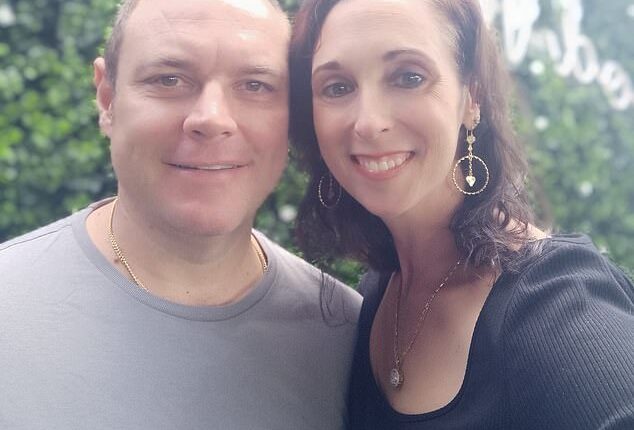Deborah Terkely never skipped a beat when it came to her health.
A busy mum-of-two running a small family business, she still made time for regular blood tests, breast checks, thyroid scans – the lot.
‘I always told my doctors to make sure they checked my thyroid, because my sisters have issues,’ Deborah told Daily Mail.
‘My blood tests always came back perfect.’
So when the then 39-year-old was suddenly struck down by her first ever excruciating migraine in 2022, she knew something wasn’t right.
‘It was quite confusing at the time because it was a very strange feeling. It was very debilitating,’ she said.
The Melbourne mum retreated to a dark bedroom, unable to move from the couch as the severe pain pulsed through her head and neck.
‘I think it even took me a while to realise that it was a migraine, but it lasted for probably three days,’ she said.

Deborah Terkely (pictured with her husband) was 39 when she suffered an ‘unbearable’ migraine that changed her life forever
‘It almost felt like I had a 20kg bowling ball stuck on my neck, and the weight and the pressure from that was creating so much pain that had to lie down.’
When her regular painkillers weren’t doing anything, Deborah’s mind went to a dark place.
Worried she might have a brain or spine tumour, Deborah booked in to see her long-time GP for some relief and to get to the bottom of the pain.
But the response floored her.
‘I explained to her what was happening, and she said to me, “Deb, you’re just getting old. Maybe just take some Panadol”,’ she said.
‘I said no to her, I knew something wasn’t right. I felt let down.’
Refusing to be brushed off, Deborah sought out a second opinion – and it may have saved her life.
This time, the doctor immediately ordered an MRI.

After her long-time GP dismissed her saying she was ‘just getting old.’ Deborah sought a second opinion which revealed a three-centimetre mass on her thyroid

A biopsy confirmed the worst. She had thyroid cancer which had spread to her lymph nodes and she needed surgery immediately. Pictured: Deborah Post-surgery
‘I was explaining it, and he [the specialist] was writing the script for me for the MRI right there and then,’ she said.
‘He said “we’re not going to muck around, even if it’s nothing, we’re just going to have a look”.’
The good news? Her brain was clear. But the scan revealed something else – a three-centimetre mass sitting on her thyroid.
Soon after, a biopsy confirmed it was thyroid cancer. It had already spread to her lymph nodes.
Feeling shocked and still in disbelief, Deborah also felt a sense of relief to know that there was a reason behind all of her pain.
‘But then it was also the fear of, “am I going to die?”,’ she said.

Interestingly her migraine had no relation to the cancer. Deborah had no symptoms – no lumps or pain – and her thyroid function tests were completely ‘normal’ beforehand
Ironically, the mystery migraine disappeared just as the cancer was discovered.
It had no relation to the cancer, according to her specialists. Deborah had no symptoms of thyroid cancer – no lumps or pain – and her thyroid function tests were completely ‘normal’ beforehand.
Despite a family history of low thyroid function, Deborah’s levels had never raised any red flags.
Looking back, she believes the crippling headache was triggered by a stressful family situation, but it was the unintentional warning sign that led to the cancer diagnosis.
She was booked in for surgery that following January, a wait that took a heavy emotional toll.
The wait was excruciating, especially over the Christmas period.
In a six-hour operation, surgeons removed Deborah’s entire thyroid and 70 per cent of her neck lymph nodes. Many were already cancerous.
‘I was in hospital for three days with two tubes coming out of my neck to drain the fluid from the surgery,’ she said,

Looking back, she believes the crippling headache was triggered by a stressful family situation, but it was the unintentional warning sign that led to the cancer diagnosis
‘I came home and needed the tape on for another two weeks. And then there was a lot of forced rest.’
Post-surgery, she was left with a 13cm scar running from her ear down her neck. What followed was a mental battle she never anticipated.
Deborah was also terrified of what her scar would look like when she took off her bandages.
‘At the end of the day, my priority was to get the cancer out. I knew I was going to be left with the scar, and that’s just what it is,’ she said.
But in a silver lining no one saw coming, Deborah’s road to recovery inspired a booming business idea.

Post-surgery, she was left with a 13cm scar running from her ear down her neck
Years earlier, Deborah and her husband had launched their low-tox brand, L’ada Soaps and Scents, after learning soap-making from her mother-in-law.
After the surgery, she began experimenting with a scar serum to help her own healing and within weeks, even her doctor was stunned by the results.
‘It was just incredible. The way [and] the speed it healed was amazing, because when I took my tape off, my scar was extremely raised,’ she said.
At her six-week check-up, the surgeon asked what she had been using. He said he’d never seen such fast results.
Deborah shared her journey on social media to raise awareness, and followers quickly became obsessed with the fading scar and demanded the product.
She hadn’t planned to sell it, but the demand spoke for itself.
‘My customers started messaging me, saying, “Deb, when is this serum going to be available? I’d like to try it I’ve got scars too”,’ she recalled.
‘It wasn’t until a number of people had come to me that I thought, well, we’re in the business of helping people.’

Deborah’s road to recovery inspired a booming business idea when she began experimenting with a scar serum to help her own healing

Pictured: Deborah’s L’ada Skin & Scar Serum ($40)
Two years on, her scar is barely noticeable, and she now wears it like a badge of honour.
Deborah now has the all clear, but it never leaves her mind.
‘Any unusual lumps I freak out but I just have to remind myself that I am okay and lymph nodes swell up and go down all the time,’ she said.
‘I now also have six monthly ultrasounds, and that’s more peace of mind than anything.’
Thyroid cancer is the seventh most common cancer affecting Aussie women, and the top cancer diagnosed in women aged 20 to 24, according to the Cancer Council.
Cases have quadrupled since 1982, and nearly three times more women are diagnosed than men.
Despite that, many cases still fly under the radar.
The warning signs that people often ignore are subtle symptoms like a persistent cough, voice changes, a lump in the throat, or difficulty sleeping due to neck tightness.
With more than one million Aussies living with undiagnosed thyroid disorders, Deborah says a simple ultrasound would pick it up, and a push for answers if something feels off.
‘Trust your gut, get a second opinion, [and] find someone that will listen to you and give you the test that you need,’ Deborah said.









